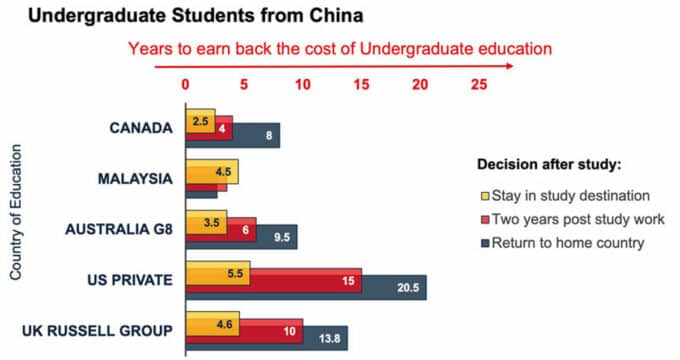Malaysia competing for a greater share of international students
UNESCO’s recent recognition of Malaysia as one of the top 10 destinations for post-secondary education bodes well for the Malaysian government’s goal to significantly increase its enrolment of international students to 250,000 by 2025. Since 2014, Malaysia has jumped in the rankings of UNESCO’s latest International Student Mobility Survey from 12th place to ninth. At the end of 2014, Malaysia hosted around 135,500 international students, studying in public and private higher education institutions as well as international high schools. That was an increase of 16.5% from 2013, according to Malaysian newspaper Sun Daily. The top sending countries for Malaysian institutions are Bangladesh, China, Indonesia, Nigeria, India, Pakistan, Kazakhstan, Yemen, Sri Lanka, and Libya. As we reported in 2014, Malaysia has sought to position itself as a regional education hub in Southeast Asia with growing international enrolment and increased government investment in the education sector. More broadly, UNESCO and others have observed that regional hubs are starting to attract larger numbers of internationally mobile students. Malaysia in particular, along with China, Korea, and Singapore, is beginning to compete with destinations such as Australia and Japan for students from a number of Asian markets. The Malaysian government has been instrumental in the establishment of two higher education zones in collaboration with private partners: EduCity Iskandar and Kuala Lumpur Education City. Investment in educational infrastructure has also been linked to the country’s strategic plans for economic development. Such zones have also helped Malaysia to become a popular host country for international branch campuses. The EduCity Iskandar campus, for example, is currently home to foreign institutions such as Newcastle University Medicine Malaysia, University of Southampton Malaysia Campus, Netherlands Maritime Institute of Technology, and University of Reading Malaysia. On the strength of these internationalisation efforts, organisations such as the British Council have also recognised Malaysia as a world leader in transnational education. In September 2015, The University of Nottingham celebrated its 15th anniversary as the first British institution to open a campus in Malaysia. "The University of Nottingham made internationalisation of higher education as its core strategy in the 90s. At around the same time the Malaysian government was liberalising their higher education sector by inviting foreign universities to set up campuses here," said Govindan Nair, director of the international office at University of Nottingham Malaysia Campus (UNMC). Many of these branch campuses were established to serve the local Malaysian student population. In 2014, Malaysia was one of the top ten sending countries, with almost 60,000 students abroad, according to UNESCO. However, the number of Malaysian students going abroad has declined slightly in recent years, with more students opting to pursue international education opportunities a little closer to home. "There are 11 foreign branch campuses in the country from the UK, Australia, India, the Netherlands, and China. This is testament to the [Malaysian] government’s initiative and success in making Malaysia a regional hub for higher education," says Mr Nair. Branch campuses such as UNMC are also seeing an increased number of international students. "At the moment 70% of our students are Malaysian," he adds. "Our International students come from over 80 different nationalities from all over the world. The Malaysia campus attracts the majority of its international students from Pakistan, India, Egypt, China, Indonesia, Bangladesh, Maldives, South Korea, Kazakhstan, Seychelles, Mauritius and Iran." He expects the number of international students to continue to grow, but adds that "how much further growth in the industry depends very much on the government’s policies and implementation. There is greater demand from the industry to ensure policies are implemented swiftly and reviewed by the relevant government agencies without much hassle from the government machinery." Mr Nair also notes that Malaysia’s strategic location in the region and recognition as a liberal, multi-ethnic country has made it an attractive study destination. "International students are impressed with the multiple options for quality higher education institutions in the country. Along with a relatively low cost of living and a vibrant culture, coupled with a relatively safe environment, this presents the country with a potent recipe to attract international students and make Malaysia a hub for higher education." As we reported last year, the government has released a ten-year strategy for higher education that aims to place Malaysia among the top one-third of nations in the world for education, and to increase the number of globally ranked Malaysian universities. Universiti Malaya currently ranks 27, along with four Malaysian institutions in the top 100, in the QS University Rankings: Asia 2016. Malaysia also currently counts four institutions in the top 200 Times Higher Education 2016 Asia University Rankings. At number 70, the highest-ranking Malaysian institution is Universiti Teknologi Malaysia, a public research university specialising in engineering and technology. Some educators have raised concerns that Malaysia may have been more successful at marketing itself as an international education destination than in actually building a high-quality system. Experts interviewed by Times Higher Education voiced concerns that Malaysia should be performing much better in university rankings given the amount of money the government has invested in higher education in recent years. And last year, University World News also reported that many private institutions in Malaysia, including foreign branch campuses, were facing financial difficulties and were lagging behind public institutions. However, UNMC’s Govindan Nair remains optimistic about Malaysia’s potential as a burgeoning educational hub as long as the public sector continues to work closely with university partners. "The future growth in this sector will be lead through innovate learning processes and quality education catering towards a technology savvy generation. The policy makers must work hand in hand with the industry players to develop future strategies to embrace the change," he said.


















